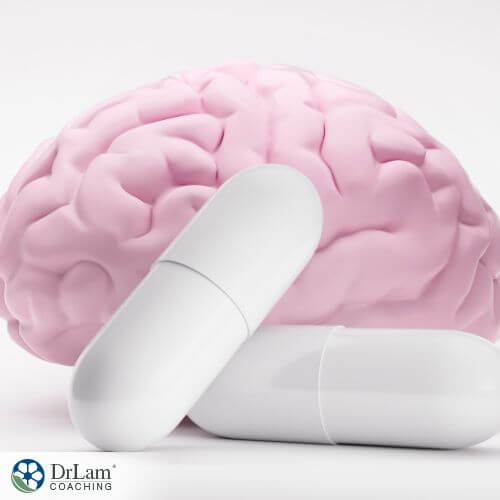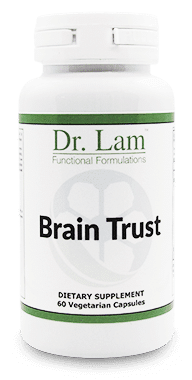 Your brain is responsible for many important functions such as memory, learning, and attention. If your brain is not performing optimally, many of these functions may begin to decline. There are many supplements available that can help boost your brain health. One of these less well-known supplements is citicoline. This article will explore what exactly this supplement is, how it may help your brain health, and the potential benefits of citicoline.
Your brain is responsible for many important functions such as memory, learning, and attention. If your brain is not performing optimally, many of these functions may begin to decline. There are many supplements available that can help boost your brain health. One of these less well-known supplements is citicoline. This article will explore what exactly this supplement is, how it may help your brain health, and the potential benefits of citicoline.
Choline is a nutrient that is available in foods such as:
This nutrient is one of the building blocks for two important compounds in your body, acetylcholine and phosphatidylcholine. These compounds are both essential for your brain health.
Acetylcholine is a brain hormone involved in cognitive functioning. Phosphatidylcholine is involved in the production of phospholipids that are necessary for the health of cell membranes, helping to support the brain's structure. Without adequate choline, these two compounds cannot be produced.
Your liver can naturally produce choline. However, it is a small amount that is not enough to meet your daily requirements. This makes it important to rely on choline from food sources as well as supplemental sources.
Citicoline is the form of choline that is available in supplements and is identical to the form that your body produces. This form is cytidine-diphosphocholine (CDP-choline). When you ingest oral citicoline, this form is broken down into choline and cytidine, which both cross the blood-brain barrier and then are able to enhance levels of acetylcholine and phosphatidylcholine in the brain.
Phosphatidylcholine is a crucial component of the cell membranes. In the brain, it's important for there to be a high turnover of cell membranes. This helps to maintain the fluidity and plasticity of the brain, the structure of the cells, and communication between the brain cells (or neurons). Neurons have multiple different roles in the body and one of their roles is memory.
In order for neurons to carry out their various roles, the structure of the cell needs to be protected. From the age of 20, the phospholipid content in brain cells starts to decrease. This results in a gradual loss of cell structure and loss of functions such as memory.
Citicoline can help to enhance the production of phospholipids, thus helping to enhance memory. Studies support this, with one study suggesting an improvement in memory after 12 weeks of supplementation and another study suggesting an improvement in verbal memory in older adults (1,2).
Phosphatidylcholine makes up 30% of your phospholipids and is necessary for the phospholipids to function adequately. Optimal membrane health is necessary in your neurons as it helps to maintain the integrity of cells, helping to control what enters and leaves the cell. If the cell membrane is not optimal, this can allow toxins to enter the cell. Therefore phosphatidylcholine is necessary for the protection of the neurons. Citicoline is a building block of phosphatidylcholine, indirectly helping to enhance membrane health, thus protecting neurons.
 The mitochondria is an organelle found in cells and is also known as the powerhouse of the cell. This is because of the role it plays in producing energy for the cell. One study researching the effect of citicoline found that this chemical supports the health of the mitochondria, and after six weeks of citicoline supplement, there was a 14% increase in energy produced in the brain. This may help to increase energy in the brain, assisting in important processes such as memory and learning (3).
The mitochondria is an organelle found in cells and is also known as the powerhouse of the cell. This is because of the role it plays in producing energy for the cell. One study researching the effect of citicoline found that this chemical supports the health of the mitochondria, and after six weeks of citicoline supplement, there was a 14% increase in energy produced in the brain. This may help to increase energy in the brain, assisting in important processes such as memory and learning (3).
Citicoline is also one of the building blocks of acetylcholine, an important brain hormone. When citicoline is ingested either through food sources or in supplemental form, it is broken down into choline which is then able to cross the blood-brain barrier. The brain then uses this choline to produce acetylcholine. This brain hormone can help to improve cognitive performance. One study showed that supplemental citicoline increased the release of acetylcholine in the hippocampus, an area of the brain that is responsible for learning and memory (4).
Not only does citicoline increase levels of acetylcholine in the brain, but it also increases levels of other important brain hormones such as dopamine and serotonin. These two hormones are involved in regulating mood and can help to ease symptoms of depression and anxiety. However, whilst research is promising, more research is necessary to draw conclusions about this potential benefit.
Inflammation in the brain is thought to be one of the ways in which conditions such as Parkinson's and Alzheimer's disease can occur. Inflammation within the brain can be caused by multiple factors such as injuries, poor lifestyle habits, and inadequate diet. Citicoline has anti-inflammatory properties and can help to reduce the occurrence of inflammation within the brain. This not only helps to improve cognition but may help to reduce the progression of brain conditions. One study researching the effects in older adults found that citicoline can help to improve cognitive and behavioral disturbances (5).
A traumatic brain injury (TBI) is an injury that occurs to the brain either by a bump, blow, or an injury that penetrates the brain. One common example of a mild TBI is a concussion.
These injuries can result in changes in memory, learning, headaches, and confusion. Citicoline may assist here by helping to repair and regenerate new brain cells, reducing inflammation as well as increasing levels of acetylcholine in the brain.
Studies suggest that citicoline in individuals with TBIs may help to improve cognitive and motor function as well as help to manage post-concussion symptoms (6,7).
Whilst many may consider a stroke to be an injury to the brain, it is rather a brain condition that can result in brain injury. A stroke is when there is a reduction in blood flow to the brain resulting in brain injury such as cell death and damage to the remaining brain cells. This can cause a cognitive decline. Studies suggest that the effect of citicoline may help to improve functional as well as cognitive outcomes in these individuals (8).
The supplement citicoline is usually well tolerated in the body with minimal side effects. Some side effects that may be experienced include:
These side effects generally disappear without medical attention. There is research that suggests that citicoline can affect the blood pressure. However, the relationship is not clear, as some evidence suggests that citicoline can increase blood pressure, whereas other evidence shows that it can decrease blood pressure. More research on this effect is necessary. However, if you have blood pressure problems, it may be best to talk to your doctor first.
Citicoline is safe to use daily, with some individuals using it twice a day for up to 12 months.
 Multiple factors can affect your brain health. Stress is a factor that can have a negative effect on not only your brain but also your health. To help your body handle stress, your body utilizes the NeuroEndoMetabolic (NEM) Stress Response System. This system consists of multiple circuits that aim to support your body for optimal functioning.
Multiple factors can affect your brain health. Stress is a factor that can have a negative effect on not only your brain but also your health. To help your body handle stress, your body utilizes the NeuroEndoMetabolic (NEM) Stress Response System. This system consists of multiple circuits that aim to support your body for optimal functioning.
Whilst your body has the ability to handle short-term stress, in chronic stress, your body is unable to keep up with the demand, and imbalances within the NEM system start to arise. This is the beginning of Adrenal Fatigue Syndrome (AFS). AFS is the non-Addison's form of adrenal dysfunction, where the body's stress response cannot keep up with life's chronic stressors. Symptoms of AFS will depend on where the imbalance is occurring, One of the circuits of the NEM system is the neuroaffect circuit. This circuit is responsible for regulating how you think and feel, and consists of the brain, the autonomic nervous system, and the gut microbiome.
Symptoms of an imbalance within this system include changes in sleep patterns, anxiety, depression, brain fog, and experiencing stress in situations that would typically not cause stress. Citicoline can help to manage some of these symptoms such as low mood and brain fog.
Citicoline is a chemical that shows promise in improving multiple aspects of brain health including:
If you are concerned that your brain health has been declining or are looking for ways to boost your brain health, the Dr. Lam team can assist. We offer a free, no-obligation phone consultation at +1 (626) 571-1234 where we will privately discuss your symptoms and various options. You can also send us a question through our Ask The Doctor system by clicking here.

Boost Neurocognitive Power with Brain Trust
ERi, N., et al. "Citicoline and Memory Function in Healthy Older Adults: A Randomized, Double-Blind, Placebo-Controlled Trial." J Nutr., vol. 151, no. 8, Aug. 2021, pp. 2153-60. https://jn.nutrition.org/article/S0022-3166(22)00267-X/fulltext
Spiers, PA, et al. "Citicoline Improves Verbal Memory in Aging." Arch. Neurol., vol. 53, no. 5, May 1996, pp. 441-8. https://jamanetwork.com/journals/jamaneurology/article-abstract/594018
Silveri, MM, et al. "Citicoline Enhances Frontal Lobe Bioenergetics As Measured By Phosphorus Magnetic Resonance Spectroscopy." NMR in Biomedicine, vol. 21, no. 10, Dec. 2008, pp. 1066-75. https://analyticalsciencejournals.onlinelibrary.wiley.com/doi/10.1002/nbm.1281
Roy, P., et al. "Effects of Choline Containing Phospholipids on the Neurovascular Unit: A Review." Front. Cell. Neurosci., vol. 16, Sep. 2022. https://www.frontiersin.org/articles/10.3389/fncel.2022.988759/full
Fioravanti, M., and Yanagi, M. "CDP Choline for Cognitive and Behavioural Disturbances Associated with Chronic Cerebral Disorders in the Elderly." Cochrane Database Syst Rev, vol. 2, 2004. https://pubmed.ncbi.nlm.nih.gov/15106147/
Secades, JJ. "Role of Citicoline in the Management of Traumatic Brain Injury." Pharmaceuticals (Basel), vol. 14, no. 5, May 2021, p. 410. https://www.ncbi.nlm.nih.gov/pmc/articles/PMC8146347/
Levin, HS. "Treatment of Postconsussional Symptoms with CDP-Choline." J Neurol Sci, vol. 38, no. 42, Jul. 1991. https://pubmed.ncbi.nlm.nih.gov/1940965/
Alvarez-Sabin, J., and Roman, GC. "The Role of Citicoline in Neuroprotection and Neurorepair in Ischemic Stroke." Brain Sci, vol. 3, no. 3, Sep. 2013, pp. 1395-1414. https://www.ncbi.nlm.nih.gov/pmc/articles/PMC4061873/
Citicoline has many benefits, including enhancing attention and focus. Studies suggest that it can be as effective as conventional medication such as Adderall. However, it is important to discuss this with your healthcare provider before you make any changes to your medication regimen.